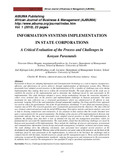| dc.description.abstract | Parastatals in Kenya are adopting Information and Communication Technology as a t
ool to improve transparency,
efficiency and effectiveness in service delivery, through i
mplementation of information systems (ISs). Whereas
parastatals have adopted several practices in the implementati
on of ISs, a number of challenges may arise during
implementation thus, making them not to realise the envisioned benefi
ts. The main objective of the study was to
establish the practice of ISs implementation and to determine the
challenges faced by state parastatals in ISs
implementation. This study therefore adopted a survey design methodology
because the researcher intended to
collect cross sectional data on ISs practice and implementation challe
nges in Kenyan parastatals. The main
instrument for data collection was a structured questionnaire which
was administered to IT officers in state
parastatal, targeting 50% of the total population through judgmental samplin
g. The Drop-and-Pick later approach
was used to collect the questionnaire. Out of the 65 questionnaires
distributed, 53 were filled and returned giving a
response rate of 82%. The research questions were systematicall
y generated from the objectives. The data collected
was, cleaned, coded and analysed with the aid of SPSS package. Descriptive
statistics and factor analysis were used
to help in drawing comparisons and conclusions. It was assumed in data analysis th
at the results obtained were
quite a representative for the general population. The findings of
the practice of ISs implementation in Kenyan state
parastatals indicate that most state parastatals have adopted several
practices in their ISS implementation. In
addition, the findings show that there is lack of detailed risk log
and risk management procedures which are
fundamental for successful ISs implementation. The study further,
found that the following challenges are faced by
Kenyan state parastatals in ISs implementation. These include the ch
allenge of; process and structure, procurement
and communication, information systems design and people management, corruption,
technical and systems tuning.
The study findings drew the following conclusion, state parastatal have
adopted several practices of ISs
development and implementation. Whereas some of the practices are g
ood, some of the practices are the basis of the
challenges faced by state parastatals in ISs implementation. As obser
ved in the literature the challenges tend to
compare heavily with literature, but fall on process, people and I
Ss management aspects. These can be addressed by
embracing recognized ISs implementation standards, reducing bureaucracies an
d transparent in ISs procurement.
In addition, there is need for the management to hire qualified I
T staff to spearhead automation activities | |

